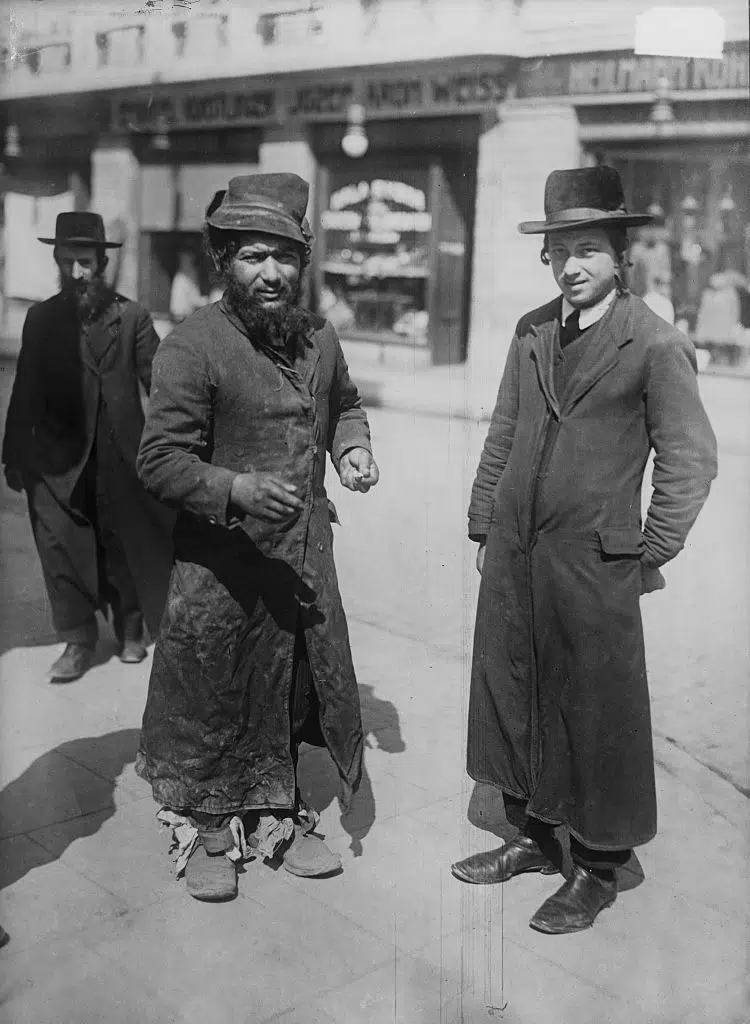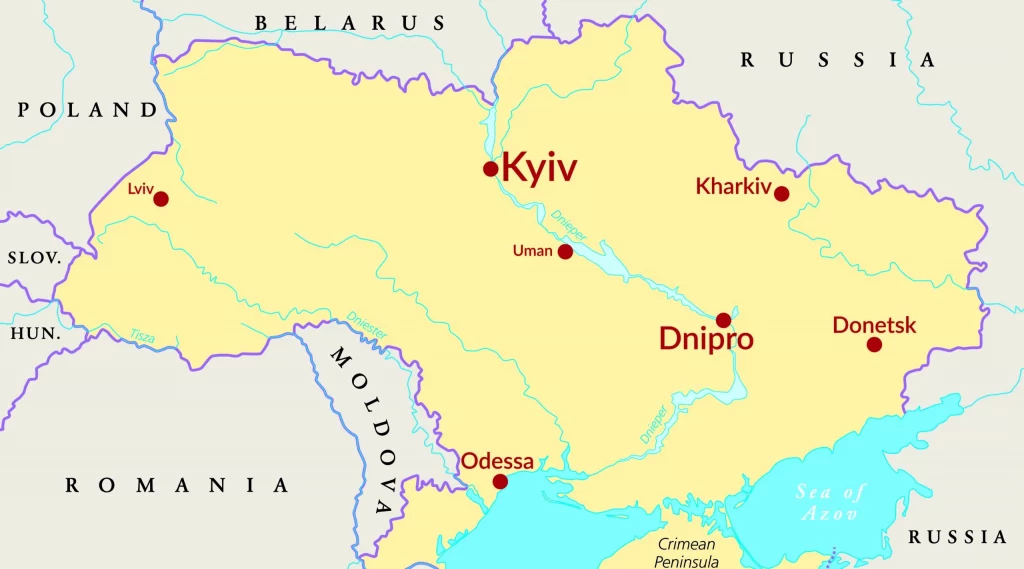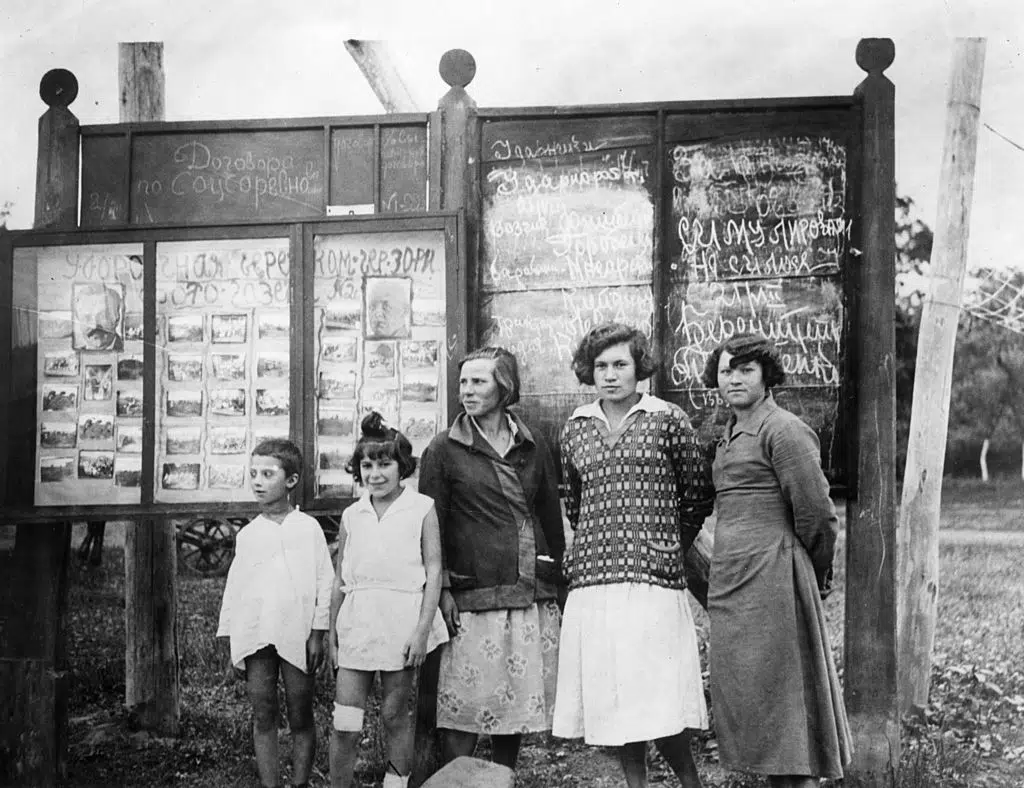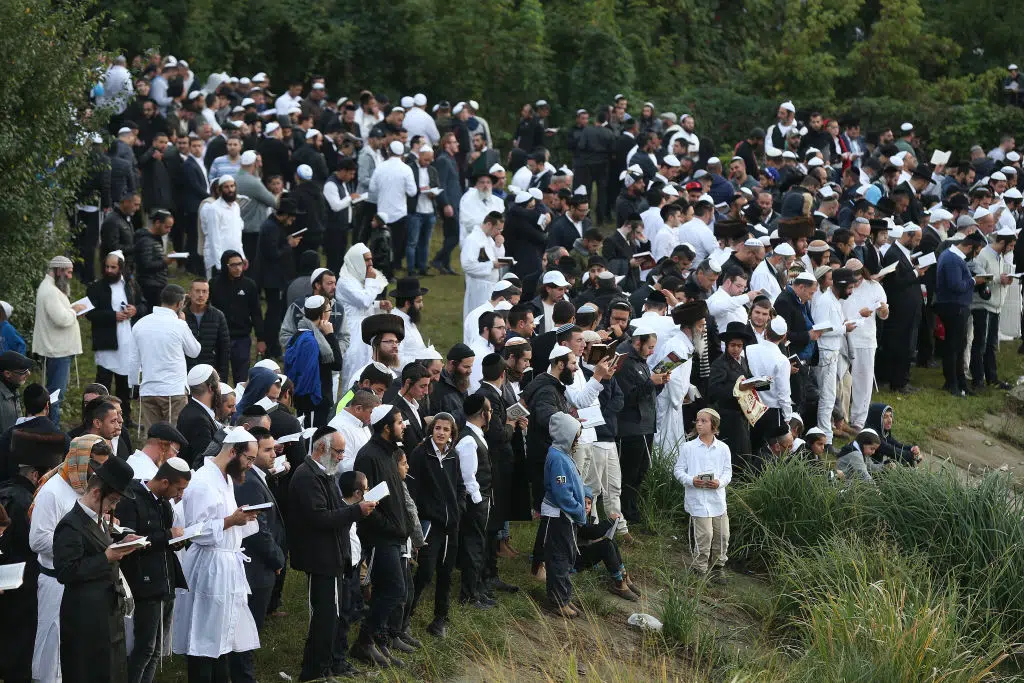Who Are The Jews Of Ukraine?
Source: https://jewishunpacked.com/who-are-the-jews-of-ukraine/
by: Shaked Karabelnicoff | Published: March 24, 2022
Ukraine is home to one of the world’s largest Jewish communities and its historical roots run deep. It is the birthplace of some of Judaism’s most distinctive ideologies and traditions – the Hasidic movement emerged out of Ukraine and the country has a rich legacy of Yiddish culture.

Jewish men in Galicia, Ukraine, circa 1912. (Photo by FPG/Getty Images)
Ukraine has also been the site of extreme antisemitism. At the end of the 19th century and the beginning of the 20th century, the Jewish community faced pogroms (an organized massacre or riot against Jewish people), policies which tightened restrictions on where Jews could live and restrictions on the occupations that Jews could attain. During the Holocaust, more than one million Jews were killed by the Nazis and local Ukrainian supporters. In fact, the country is home to the most horrific violence ever committed against the Jewish people during the Holocaust.
Later, in the Soviet Union, the Jewish community’s religious life was squashed by the Soviet authorities, according to Israeli author Matti Friedman.
“Jewish identity didn’t exist in the Soviet Union, because it couldn’t,” Gal Beckerman of The Atlantic wrote. “To be a Jew from the time of Stalin onward was to have a stamp in your internal passport that marked you as such (just as a Ukrainian or Latvian national identity was also indicated). There was very little opportunity for Jewish community, religious practice, or even bare-bones cultural expression.”
After the collapse of the Soviet Union, many Jews immigrated to Israel. For the few hundred-thousand that stayed, including Ukraine’s current President Volodmyer Zelensky, Jewish life began to take shape in new ways.
How many Jews live in Ukraine?
Today, it’s hard to calculate Ukraine’s Jewish population accurately and estimates range from 49,000 to 400,000.
Hebrew University demographer Sergio Della Pergola put the number at 49,000 in his “World Jewish Population, 2019,” while The European Jewish Congress estimates the number of Jews to be between 360,000 and 400,000.
The most recent Ukrainian census was in 2001– the next census was scheduled to take place in 2020 but was postponed to 2023, according to the State Statistics Service of Ukraine.
Where do most Jews live?

Map of Ukraine, (Courtesy: St. Louis Jewish Light)
Most of Ukraine’s Jews live in the country’s largest cities like Kyiv, Odessa and Kharkiv. However, many other smaller Jewish communities exist across the country.
“Some [Jews], especially elderly ones, live in smaller cities and scattered impoverished villages,” according to The Jewish Telegraphic Agency’s News Director Gabe Friedman, who put together a shortlist of places with large Jewish communities.
“Because Russia’s attack has taken aim at the entire country, all Jewish communities face exposure to violence and the consequences of war,” he noted about the current situation.

A group of Jewish members of the ‘Red Star’ movement standing by ‘Praise and Blame’ boards at Kharkov, Ukraine. (Photo by General Photographic Agency/Getty Images)
The following cities are home to Ukraine’s most prominent Jewish populations.
Kyiv is Ukraine’s capital city of almost 3 million people and is home to about 110,000 Jews, according to JTA, and half a dozen active synagogues.
Dnipro is an eastern Ukrainian city with around 60,000 Jews, according to The Atlantic. The city has 10 synagogues, kosher restaurants, a mikvah and multiple Jewish-owned businesses. Their community center called ‘Menorah’ opened in 2012. The center is a 22-story building shaped like a menorah and reportedly serves 40,000 people a day.
Kharkiv, an industrial city near the Russian border, is home to about 45,000 Jews and at least five synagogues.
Of the one million people that live in Odessa, a southern port city, around 45,000 are Jewish. They have four active synagogues, a Jewish museum, two Jewish community centers, a dozen Jewish schools or kindergartens and four orphanages for Jewish children.
Uman is a small Ukranian city with a total population of just over 80,000. It’s notable for some members of the Jewish community because the city houses the grave of 18th-century Hasidic Rabbi Nahman of Breslov. Every year around Rosh Hashanah, tens of thousands of Hasidic Jews make an annual tribute pilgrimage to Rabbi Nahman of Breslov’s grave. A few hundred Jews, mostly Israelis, now live there year round.

UMAN, UKRAINE – SEPTEMBER 10: Religious Jews perform tashlikh, a Jewish atonement ritual, at the bank of a lake formed by the Umanka River on the first day of Rosh Hashanah on September10, 2018 in Uman, Ukraine. Tens of thousands of Hasidic and Orthodox Jews, including many Breslov (also called Bratslav) Hasidim, a specific group of Hasidic Jews, have made the annual journey from all over the world to Uman to visit the tomb of Rebbe Nachman of Breslov, who founded the Breslov sect in 1802. The pilgrims come for a spiritual experience and religious discussions, but also to celebrate in what one participant describes as a “Jewish Woodstock.” The Breslov sect grew, attracting thousands of followers, until Stalin’s purges and decimation in the Holocaust. Breslov Hasidism has since revived and its followers live mostly in Israel, the United States and Great Britain. (Photo by Sean Gallup/Getty Images)
In 2020, President Zelensky said in an interview that his government was hoping to construct a “Little Jerusalem” in Uman that would include a historical museum, a big park and reconstructing the current synagogue there.
“We want to make an authentic little town. We created the name “Little Jerusalem” as an idea, to make it very authentic, in a very professional way,” he said.
Today the community has been evacuated following the deadly shelling of the town by Russian forces.
Another one of Orthodox Judaism’s largest sects has roots in Ukraine. Menachem Mendel Schneerson, known simply as “The Rebbe” to members of the Chabad-Lubavitch movement, was born on April 5, 1902, in the Black Sea port of present day Mykolaiv, Ukraine.
A unique Jewish identity
Given its long history, Ukrainian Jewish identity is more complex than meets the eye.
The Soviet Union silenced most to all of Jewish religious life, in an attempt to redefine what Judaism meant, how it looked and the way it was practiced.
“Many Soviet Jews’ experience suggested that Jewishness was akin to race: a vague yet inescapable reality,” explained researcher and writer, Izabella Tabarovsky, in a journal article.
- If you want a real honest opinion on this click the replaced link and hear what the major funder of Judaism and Zionism has to say about it: Jacob Rothschild! (starts 0:25 mark)
Due to their circumstances, Soviet Jews developed a distinct culture and practice of Judaism, Tabarovsky explained.
“They might not have had much knowledge of Jewish culture or tradition, as historian Yaakov Ro’i has noted, but they felt themselves to be Jewish. They had “an existential feeling of Jewish solidarity” and “common fate,” and Jewish pride emanating from their own and other Jews’ professional and cultural achievements,” she noted.
“Being Jewish to them was more of a mentality and a shared interpretation of reality than a set of specific Jewish expressions.”
Yuliya Komaska (@ymoska) [[https://twitter.com/ykomska/status/1121166606040739840| April 23, 2019
Ukraine’s Jewish President
This is an experience Ukraine’s Jewish President, Volodomyr Zelensky, said he shared about his own identity.
When asked about his religious observance in an interview, Zelensky described himself as being from: “An ordinary Soviet Jewish family.”
And no, it doesn’t make him any less Jewish in his own or other Ukrainians’ eyes.
Complex, I know
Izabella Tabarovsky (@IzaTabari) March 01, 2022
“Most Jewish families in the Soviet Union were not religious. You know religion didn’t exist in the Soviet state,” he explained.
Zelensky has suddenly shot into the spotlight, triggering a sequence of questions and discussions about his upbringing, religion and faith.
Ben Feisenburg (@BenFeisenburg) March 02, 2022
As Tabarovsky summarized in a Tweet, “[Zelensky] is a post-Soviet Jew. He doesn’t define himself as a Jew on basis of religion. And no, it doesn’t make him any less Jewish in his own or other Ukrainians’ eyes. Complex, I know.”
When the Soviet Union collapsed in 1991, more than one million FSU Jews immigrated to Israel within 10 years. (Read more about how the FSU aliyah changed Israeli society.)
For those that remained, “the end of the Soviet Union allowed some air to enter Jewish communal life,” explained Gal Beckerman.
“Zelensky and his family were part of the few hundred thousand Jews who stayed, content to assimilate in a post-Soviet world.”
Although the President had been publicly outspoken about his Judaism, it wasn’t until recently that his Jewishness became a subject of interest.
In 2020, Zelensky said about his Judaism: “Nobody cares. Nobody asks me about it.”
Now, he’s known as the world’s “Jewish hero.” The highest form of proof against Russia’s claims that Ukraine needs to be “denazified.”
Tags: Ukraine, ZOG, YiddishLying, Judaism, Zionism
This page may have a talk page?.
Access and use of this site by any means implies consent to the Agreement of Use. © Hellene Sun
